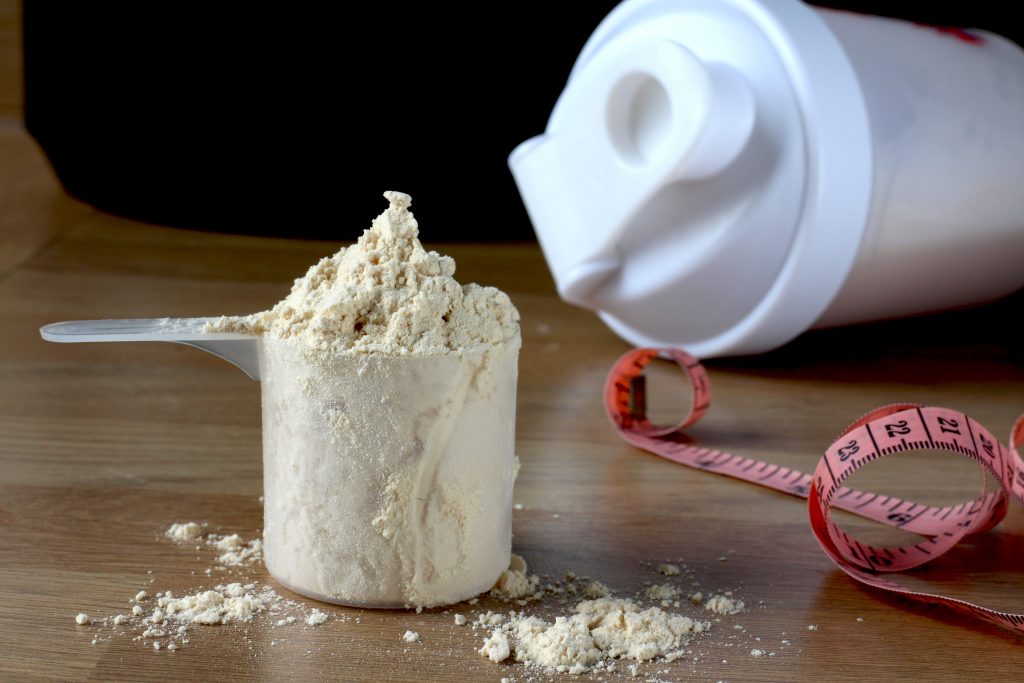Kent Sport health and fitness instructor Sarah Black continues her analysis of protein and considers whether shakes can take our workout regime to the next level.
How many of us reach for the miracle muscle powders before, after and during training sessions? I’m confronted with many questions surrounding the subject of protein supplements in the exercise world. I always answer the question with a question of my own, “What are you supplementing?” The clue is in the name – Protein supplement, so would it suggest it is supplementing food? A supplement is usually temporary, it means something is missing and you are not gaining it through the diet.
There should be reason to require the need for extra protein in an individual. My previous article addressed the calculation requirements and it explained what protein does and why we need it. Therefore do we need protein shakes to acquire the extra amounts of protein? If muscle gains are on our agenda then training should see to the strength adaptation of muscles? With every sip do you sense muscles are being formed regardless of how little or how much training is coinciding; or is the protein shake giving you the placebo effect and optimism that it holds the ingredients to bake biceps? Protein alone does not magically grow muscles; unfortunately.
Some of the questions I get asked and people query, are if they are worth the cost? Are there alternatives we could sample without effecting the wallets and still have the exact same result with muscle formation?
Here are some reasons I think shakes are great and worthy:
Portable: I imagine walking around with a tupperware of chicken is unrealistic? Therefore, the functionality of shakes is recommended when you are trying to get protein into your diet and you lack the resources to cook, store or transport.
Taste: Personally I don’t consume protein shakes, but often I’ve seen the label peanut butter and caramel flavoured protein shake and thought mmmmm. After a workout when you are thirsty and craving a sweet kick, the thought of quenching your thirst with a milky flavoured and healthy shake might be the answer, rather than sitting down to a boiled egg?
Energy: Shakes will bode well during long continuous workouts when the body is requiring a slow release of carbohydrates and protein keeping the blood glucose level stable. Keeping hunger at bay and avoiding energy drops. Being in liquid form it can enter the blood stream quicker and when you are training for long periods you might need the fuel top ups, perfect attribute shakes hold.
Complete: We need the nine essential amino acids through diet and protein powders (quality powders) will contain complete amino acids. Which means you do not need to worry about combining foods to make up a complete protein molecule.
There are many different types of powders and forms on the market. The three common ones are whey, soy, and casein protein. Whey is the most popular at present, because it’s a water-soluble milk protein. Depending on your necessities you need to research the market and find out which powder will suit you the most. For example, vegans may wish to choose a soy powder for lifestyle reasons. Always look into the quality you choose and check the labelling which will list added ingredients, sweeteners and flavours. The amount of protein per serving versus the cost and the types of proteins used in the production of the powder.
Now for some of the cons and negatives using supplements and protein shakes. You need to question why you are needing the supplementation. An average adult does not require that much protein. Only 15% of daily calories is needed in the diet. That’s not a lot of protein for an average person. Some powders have 80 grams of protein per serving. Too much protein adds extra strain on your liver and kidneys, trying to break it down and absorb it. Do not forget excess protein cannot be stored and excess calories through protein consumption is turned into fat.
Forget the message protein is needed after a workout. Before, during, and after a workout, carbohydrates are what your body is craving. Carbs are fuel and it is what the body needs to move, perform and function effectively. The ratio of 5:1 in the form of carbs to protein is the recommended range for consumption. Although protein is important to repair post workout; we need to top up the depleted stores of glycogen. A fruit smoothie or chocolate milk drink post work out is just as effective as a protein shake.
If you eat a well-balanced diet and incorporate chicken, dairy, beef, soy, eggs, then hopefully you will get the required protein amounts through diet alone without the added need for supplementation. The diet is the best and easiest way to reach nutrition goals and considering protein is not needed excessively then this should be easily met. If you have worked out your requirements through weight (kg) x 1.8grams of protein (athlete) and you are still not reaching your guidelines – then a shake will add no harm to your diet. If you suffer injuries, if you’re fatigued during training and restrict calories or food groups through diet then shakes might suit you well to gain the extra protein.
To summarise, I would highly recommend reaching protein requirements through your diet. It is the most balanced, healthiest and cost effective way to achieve the daily amounts. Advice should be sought from a trained professional when you decide to introduce extra supplements into the diet. Gain knowledge and feedback before you decide on what is right for you.
For details about Kent Sport nutritional consultations visit our website. To stay up to date with Kent Sport news, Like UniKentSports on Facebook and follow us on Twitter and visit the Kent Sport events calendar.

